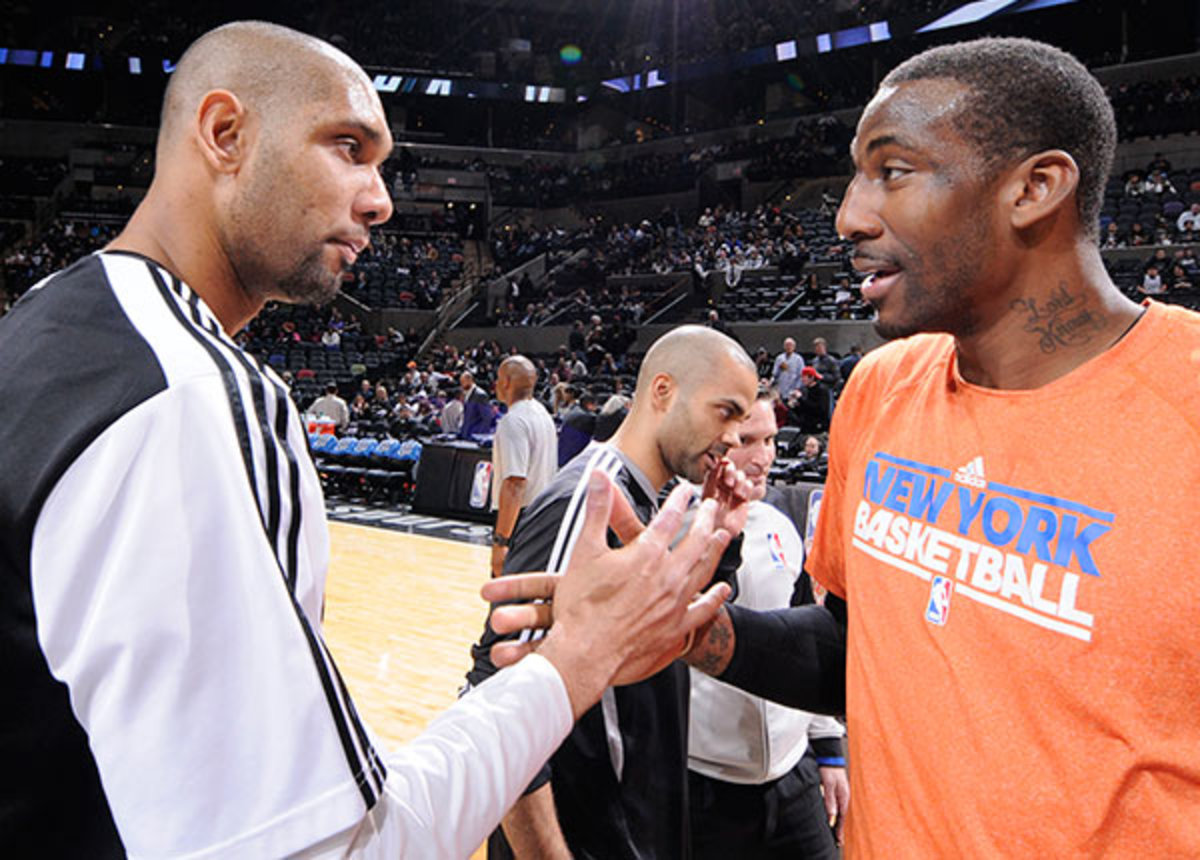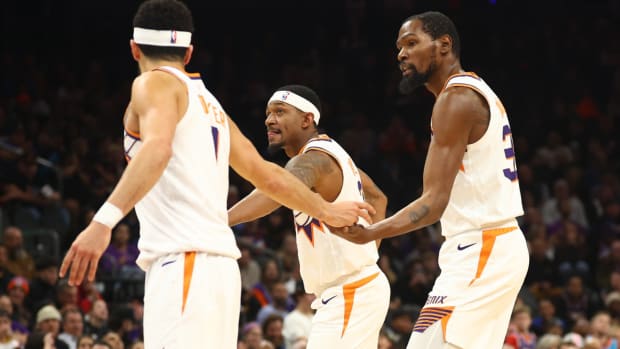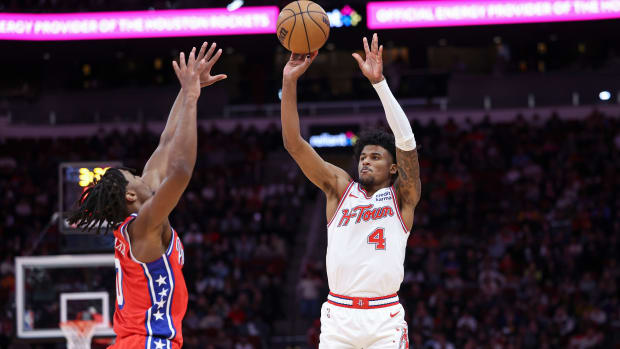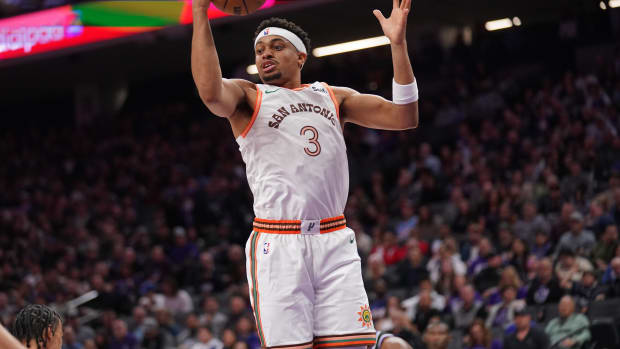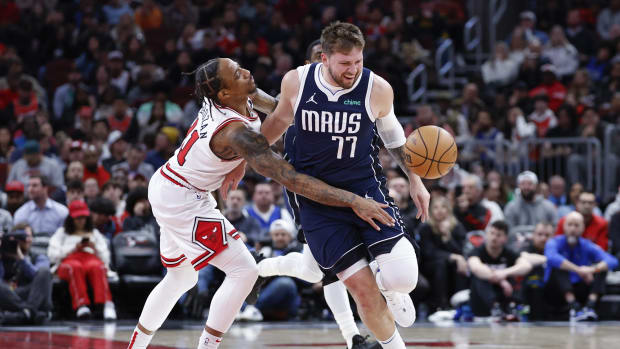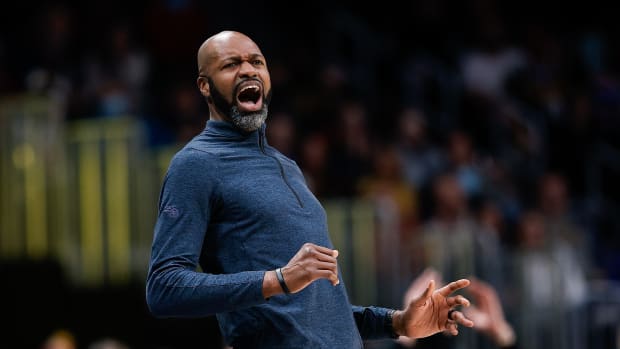Give and Go: Proposed playoff changes, Western sprint, Knicks' chances and more
A reformatted playoffs could give us a Spurs-Knicks matchup in the first round. (D. Clarke Evans/Getty Images)
Give And Go is a recurring feature in which The Point Forward’s Ben Golliver and Rob Mahoney bat an NBA topic du jour back and forth.
This week: Assessing recent developments in the final push for the 2014 playoffs. (All stats and records are through April 3.)
1. Adam Silver lets you be NBA commissioner for a day. You can implement one change to the format of the 2014 playoffs. What do you do?
Ben Golliver: I usually consider myself a traditionalist when it comes to fundamental NBA issues (schedule, sleeves, Dunk Contest etc). That said, the conference disparity issue has been hanging out there long enough and the gap between the West and East has been so wide this season that I've found myself seriously rethinking the basic structure of the playoffs. Consider: it's possible that 10 of the 16 best records will be produced in the West this year and six of the top eight teams (those who would get homecourt in the first round) are West teams. Handing out the most favorable matchups and homecourt advantages primarily by relying on geography just seems so arbitrary, even if there are travel logistics to consider.
Almost every team is being unfairly rewarded or punished under the current system. The West's best (San Antonio, Oklahoma City) will not get the easiest match-ups in (Charlotte, New York) for no reason other than geography. The West's mid-tier teams (Portland, Golden State, Dallas and Memphis) have little hope of first-round homecourt advantage for no reason other than geography. The West's bubble and missed-the-cut teams (Phoenix, Minnesota and Denver) would be looking at a totally different reality if not for the geography factor, which could wind up sending them all to the lottery rather than letting them compete for a postseason spot, while East teams that have similar or worse records (Toronto, Chicago, Brooklyn, Washington, Charlotte, New York) make it in. In the East, the elite teams (Miami, Indiana) are being rewarded with the easiest match-ups based solely on geography, the mid-tier teams (Toronto and Chicago) are getting homecourt based solely on geography, and the weakest teams (Charlotte and New York) are only in the playoffs because of geography. Outside of convenience and history, the current system is pretty illogical. Some might even say it's broken.
BALLARD: Long before Grizzlies, Joerger embodied grit and grind
I can understand the resistance to wholesale changes. My bridge solution would be to take the top eight teams from each conference, as we do currently, and re-seed them by record, regardless of geography. That way San Antonio would get the benefit of playing New York, Portland and Golden State would get to enjoy homecourt, Miami and Indiana wouldn't be able to rely on such a cakewalk, Toronto and Chicago would be forced to start the postseason on the road, and so forth. I would also be in favor of switching to a 2-3-2 format for the first round (and all subsequent rounds, really) to help alleviate any concerns over the logistics of added cross-country travel.
The first-round match-ups would look like this under a reseeding format.
- No. 1 San Antonio vs. No. 16 New York
- No. 2 Oklahoma City vs. No. 15 Charlotte
- No. 3 Miami vs. No. 14 Washington
- No. 4 L.A. Clippers vs. No. 13 Brooklyn
- No. 5 Indiana vs. No. 12 Chicago
- No. 6 Houston vs. No. 11 Toronto
- No. 7 Portland vs. No. 10 Memphis
- No. 8 Golden State vs. No. 9 Dallas
Now that's a field to get excited about. This setup would produce more interesting and competitive first-round match-ups and it would maximize the number of quality teams capable of advancing in the postseason, making for much better second-round match-ups. Imagine getting Spurs/Warriors, Thunder/Blazers, Heat/Rockets and Clippers/Pacers (four excellent pairings) in the conference semifinals under this setup rather than Spurs/Rockets, Thunder/Clippers, Heat/Bulls and Pacers/Raptors (two excellent pairings, two iffy pairings) under the current setup. Wouldn't it be worth sacrificing the Heat/Bulls rivalry factor to ensure a field that included the eight best teams and no weak links?
And ask yourself this: Would you prefer to see the conference finals as Spurs/Clippers and Heat/Thunder (possible under a reseeding setup) or Spurs/Thunder and Heat/Pacers (the most likely outcome under the current setup)? I've been waiting for the Heat/Pacers rematch all season long and I would trade it for Heat/Thunder without any hesitation. A playoff format should be chiefly concerned with keeping as many of the best teams around for as long as possible, shouldn't it?
JENKINS: Can Blazers claw their way back into contention?
One other possible (and desired) byproduct from such a system: more meaningful basketball in March and early April. Reseeding would would create an epic four-team race between the Thunder, Heat, Clippers and Pacers for seeds 2 through 5 right now. What's more, Dallas, Memphis and Phoenix wouldn't just be jockeying for the final spots in the West, they would also be in a seeding race with Toronto and Chicago. Storylines upon storylines!
Rob Mahoney: I'm not even sure if this is in Silver's jurisdiction, but I have a presentation-related proposal for an alternate broadcast experience. Once the playoff schedule winds down in the conference finals, the league should offer an alternate feed -- available via League Pass, NBATV, pay-per-view, whatever -- with no in-game commentary. This is a product the league already produces, in a sense. All I'm asking is for its distribution.
The standard broadcast with the top national commentators is still utterly essential for cultivating and maintaining interest from casual fans, though the postseason should add something special for the die-hard. Running another cut of the broadcast would be perfect for those who just want to hear the squeaking of sneakers, the chatter between players and the instructions barked from the sidelines. The natural soundtrack of the game would make for an awesome product, if only as a programming alternative.
To save FCC employees from potentially fatal stress levels and protect the broadcast contracts already in place, I'm even willing to make this a next-day affair. Just replace the broadcast replays that air on NBA TV with the raw audio version. That way profanities could be censored and network relationships protected while still giving purists a cleaner home viewing experience. Fundamentally, basketball is a rhythmic game. Why drown out that quality when it can be packaged and dispersed in a way that would only strengthen the NBA brand?
RELATED: The All-Spotlight Team: Players who could emerge in 2014 playoffs
Eric Bledsoe and the Suns face a tough road to the postseason. (Christian Petersen/NBAE/Getty Images)
2. Which fringe Western Conference playoff team will be on the outside looking in when the season ends: Memphis, Phoenix or Dallas?
RM: If it wasn't telegraphed heavily enough in my post Thursday on the tiebreaker protocols of this three-team playoff race, let me spell it out: When considering all factors the Suns seem the most likely to fall out of the postseason picture. That's true in part for the same reason we now see Phoenix ranked an unfortunate ninth; the Suns are undercut by the NBA's three-team tiebreaker rules (with only an outside shot to improve that standing), have already lost their individual tiebreaker to the Grizzlies, and are set to decide their tiebreaker with the Mavs next week in Dallas after playing the Spurs the night prior. None of that takes Phoenix out of the running completely, though it essentially forces Goran Dragic and co. to hurdle their rivals in the standings if they're to push through to the postseason.
RELATED: Examining the Western Conference's playoff rat race
That's where the Suns' playoff candidacy takes another hit. Phoenix has the toughest schedule by far between the three teams, particularly when accounting for the home and road records of the teams they're set to encounter. The Grizzlies have a breezy slate by comparison, with an average opponent win percentage of .495 to the .621 win percentage (through April 2) of Phoenix's scheduled opponents. Dallas is a bit closer, though still in command of a slight scheduling advantage along with the aforementioned tip in their head-to-head matchup.
None of this rules out the Suns, who survived Eric Bledsoe's extended absence and a bout of late-season fatigue to keep their playoff footing. Theirs is just a tougher lot. Phoenix has to do better, record-wise, than Memphis or Dallas in order to avoid a potential tiebreaker, yet may be prevented from doing so by their rough closing schedule. Godspeed to them all the same -- the Suns have proven themselves a worthy playoff team regardless of whether they actually make the postseason cut.
BG: Things are looking bleaker and bleaker for Phoenix after the Clippers came back to beat the Suns on Wednesday and then lost to the Mavericks on Thursday. If we grant all three teams the remaining "easy" victories on their schedule, the Mavericks are at 48 wins, the Grizzlies are at 47 wins and the Suns are at 46 wins. That actually puts Phoenix in a position where they could beat both Dallas and Memphis in the head-to-heads and still wind up in ninth. Throw in their lost tie-breaker to Memphis and their rough back-to-back -- at San Antonio and at Dallas, the toughest remaining schedule quirk that any of these three teams face -- and the odds are definitely stacked against them. Friday night's game at Portland isn't technically a do-or-die game for Phoenix, but it's pretty dang close.
RELATED: Current 2014 NBA playoff projections
Dallas looks to enjoy a clear edge over Memphis for the seventh seed, with the tiebreaker in hand, no remaining back-to-backs, and only one difficult road game left (at Memphis). My best guess by eyeballing the remaining opponents for all three: Dallas finishes at 49 wins, Memphis at 48 wins and Phoenix at 47 wins. If that is how it shakes out, the Mavericks (second-best offense in the league since Jan. 1) and the Grizzlies (third-best defense in the league since Jan. 1) will have earned their postseason trips with 14 late-season weeks of elite play on their preferred side of the ball.
The Bulls-Nets series went seven games in the first round last postseason. (Jonathan Daniel/Getty Images)
3. If the current NBA playoff projections hold up, which first-round playoff series has the best chance to go seven games?
BG: There's always a chance that none of them do. Miami, Indiana, San Antonio and Oklahoma City all should be in a position to take care of business quickly, which cuts down the options considerably. The Clippers tend to be excluded from that fab four, but they currently rank second in point differential, making them a possible sleeping giant. Even though Clippers/Warriors is a rivalry that just about everyone wants to see renewed and there's no way Golden State goes down without a protracted fight, I can see the Clippers prevailing in five or six games (if healthy). This Clippers team is much better suited for postseason play than were the 2013 Nuggets, who were upset by the Warriors in a tight series. I think Golden State has taken a step forward from last year, but their offense has been roughly league average since the All-Star break, while the two teams have very similar defensive rankings during that time period. Stephen Curry is amazing, but he's going to need a lot of help to keep up with L.A.'s attack.
RELATED: The Fundamentals: What's plaguing the Pacers?
That leaves Rockets/Blazers, Bulls/Nets (which went seven last year) and Raptors/Wizards. All three figure to be competitive. I'll go with Rockets/Blazers, as it's the tightest by point differential (Houston is +4.7, while Portland is +4.1). Both teams possess high-efficiency offenses, both have multiple All-Stars and both sport some rotation question marks that could be ripe for exploitation. Portland's heavy reliance on perimeter shooting and inconsistent defensive performance makes them one of the most difficult teams to project: it wouldn't be surprising if they were rushed out in five games and it's also conceivable that they could spring an upset in six games. Still, Houston has won the season series 3-1, including two wins by double digits, and if they hang on to homecourt advantage down the stretch they deserve to be favored. Everyone is salivating over Clippers/Warriors, and rightfully so, but Rockets/Blazers could wind up offering just as much bang for the buck.
I can also see Raptors/Wizards going seven games, if for no other reason than both organizations are making their first postseason appearance in years and they will likely find it difficult to snare a postseason win on the road. Perhaps it's best if we delay our detailed breakdowns of as-yet-unknown pairings until the race for the No. 3 seed in the East has been decided.
RM: One possibility that jumps out immediately: A first-round rematch between the Bulls and Nets. Much has changed since those two teams stretched their series to seven games last year, though I suspect they would still match up pretty equally. Any series the Bulls play in is destined to be marked by their disruptive capabilities; against the Nets last season momentum was virtually nonexistent, with both teams laboring to occasional scores rather than streaking for minutes at a time. That kept the series competitive if not all that fluid -- a description which could fit a reprisal just as easily.
ROUNDTABLE: Worst NBA team I ever covered
It would be a battle of respectable balance against specialized brilliance, which in itself lends itself perfectly to the give and take that an extended series demands. Brooklyn is a far better offensive team than Chicago, but not so dominant in that regard as to dictate a series with scoring against such stingy defense. The Bulls are near the best in the league on that end of the floor, though the Nets, too, put in good work; since its turnaround Brooklyn has ranked in or near the top 10 in points allowed per possession, typically the mark of a playoff-worthy defense.
Physicality would be countered with lineup control. Mismatches would be managed through defensive chemistry. Every action would have its equal and opposite reaction, as neither team has the faculties to outclass the other. Here's hoping we get seven games of grime, raw execution, head games, fervor, and Tom Thibodeau hoarseness.
J.J. Redick returned to the Clippers on Thursday after a 25-game absence. (Bill Baptist/NBAE/Getty Images)
4. Which injured player is more important to its team's title hopes: the Rockets' Patrick Beverley or the Clippers' J.J. Redick?
RM: Beverley. Part of what gives the Rockets some claim as a title contender is what Beverley offers them defensively. He can be a bit wild at times, though on balance Beverley has the potential to shift a series by keeping uncomfortably close to opposing point guards at all times. It's more than just irritating; Beverley takes away passing and driving angles by cutting them off at first step, which then forces his mark to work harder for every bit of space thereafter. That can be a powerful deterrent that re-routes an entire offense, as some guards get so worn down by working to get open against Beverley that they defer to other creators.
Jeremy Lin just isn't equipped to influence the game in the same way, which could spell trouble if Beverley -- who plans to return despite a torn meniscus -- can't function as the full-speed, unbridled nuisance on which the Rockets have come to rely on. Damian Lillard or Stephen Curry will likely line up against Houston in the first round with Chris Paul, Tony Parker, Russell Westbrook, Mike Conley and/or Monta Ellis potentially waiting thereafter. Those are tough players for any team to contain, though Beverley would offer a handsy, aggressive first line of defense to complement what Dwight Howard brings in clean-up. If his injury situation becomes more complicated, Houston would then be left with a line of lacking perimeter defenders at a time where individual matchups matter most. On this particular team, Beverley is more than just a role player -- he's a make-or-break piece for his ability to hold ground against top scorers when so few other Rockets can.
MANNIX: Big Board 5.0: Top 20 prospects for 2014 NBA draft
BG: It's Beverley and it's not close. I see the pesky point guard on firm ground as Houston's fourth most important player after Dwight Howard, James Harden and Chandler Parsons. His net rating of +9 is a team-high, and the Rockets reach their peak levels of effectiveness on both ends when he is in the game. He fits like a glove alongside Harden, in terms of balancing individual strengths and weaknesses, and he gives Houston more than a fighting chance against the West's murderer's row of All-Star point guards that Rob mentioned.
I liked the Clippers' move to grab Redick last summer as much as the next guy, and any contender would welcome a committed, intelligent 39.6 percent three-point shooter into their rotation. Has L.A. really found itself unable to make due without him though? Sure, a string of injuries to wing players bent the Clippers a bit, but they never really came close to the breaking point as they cruised to the Pacific Division title. As for Redick specifically, the Clippers are 21-10 (.678) this season with him and 33-13 (.717) without him, and they've managed to put together the most efficient offense in the West despite the injuries and a number of midseason moves. A healthy Redick is better than no Redick, without question, but he just doesn't match up with Beverley on the indispensability scale. The Clippers not only have more proven pieces than the Rockets, they also have Chris Paul, a player whose distribution ability and leadership skills get the most out of his teammates, regardless if they are second- or third-teamers.
Carmelo Anthony and the Knicks are 1-2 against the Pacers this season. (Jim McIsaac/Getty Images)
5. If the Knicks steal the No. 8 seed, do they match up better against the Heat or Pacers?
BG: Two weeks! We were only two short weeks away from completely avoiding Knicks playoff talk. What did we do to deserve this?
Barring a major injury, the Miami vs. New York match-up will almost certainly end quickly and in totally embarrassing fashion for the Knicks. Last year, the Bucks entered the postseason with a minus-1.5 point differential and were housed by an average of 14.8 points as they were swept out of the first-round by the Heat. This year, New York has a minus-1.1 point differential and no compelling reason for us to expect a dramatically different result, even if Miami hasn't been quite as sharp. Remember, Milwaukee had an above-average defense last season (it seems like a million years ago, I know), while New York currently has the sixth-worst defense this year. There's a great chance that the Knicks make the Heat's offense look totally unstoppable on more than one occasion.
DOLLINGER: Knicks at No. 18 in latest NBA Power Rankings
The Heat hold a 2-1 season series edge against the Knicks, with two double-digit victories. Anything worse than a resounding five-game first-round series would qualify as a disappointment for Miami. There are only three reasons to get excited about a Heat/Knicks series: 1) to reminisce about Amar'e Stoudemire being TKO'ed by a fire extinguisher; 2) to anticipate J.R. Smith finding a way to do or say something more ridiculous than Brandon Jennings' "Bucks in six" prediction last year; and 3) to see if Phil Jackson bothers to show up to any of the games in person.
Indiana, meanwhile, is poised to enter the postseason with the second-worst offense out of the 16-team field. The Pacers would still be heavily favored against New York thanks to their league-best defense, but the "chance to steal a game or two" potential is much higher for the Knicks when facing a team prone to stretches where their offense totally stalls. At the same time, Indiana eliminated New York in six games last year, and this year's Pacers are more tested and experienced than last year's squad, while the Knicks have taken two or three big steps backwards. Envisioning anything longer than a six-game first-round series in a 2014 rematch is quite difficult.
RM: Neither? The Pacers' struggles are a prominent NBA talking point, though it would take a remarkable level of dysfunction for them to be all that vulnerable in a matchup against the Knicks. Since Andrea Bargnani's injury, New York has essentially rolled out a variant of last year's team: Explosive offensively and utterly disastrous defensively. I wouldn't trust that combination in a series against Indiana, particularly when the Pacers could create mismatches so easily, work the offensive glass as a focus and parade to the line against one of the most foul-happy teams in the league. Even if New York edges its way into the postseason, that doesn't change their roster's constitution or remedy their weaknesses. They're still a pretty limited team, albeit one with a bit more cash in its pocket after a few home playoff games.
PHOTOS: Ironman referee Dick Bavetta over the years
In honoring the question, though, I suppose the Pacers are a better matchup than the Heat. I'm still not much worried about Miami, which even in its less dominant stretches hasn't had a full roster nor full investment. There are some genuine struggles there -- enough to put the idea of a Heat three-peat very much in doubt. The choreography of Miami's frenetic team defense, in particular, is a bit worrisome. That scheme has a lower margin for error than that of any other contender, which could be perilous when the Heat run into an opponent that can test them with consistent shooting and ball movement.
The Knicks are not that. They could win a game or so in a potential series, but overall the Heat offense is so strong and so proven as to overwhelm on those grounds alone. Should Miami kick into defensive gear with the postseason urgency that most expect, that series could well be a sweep. Regardless, the point is moot; the Pacers are a better opponent for the Knicks only by a matter of degrees. The result, in either case, would be very much the same.






























